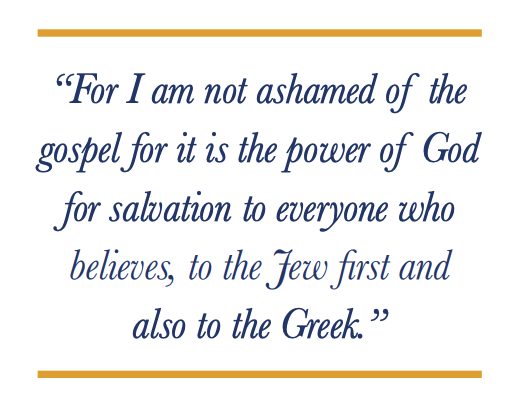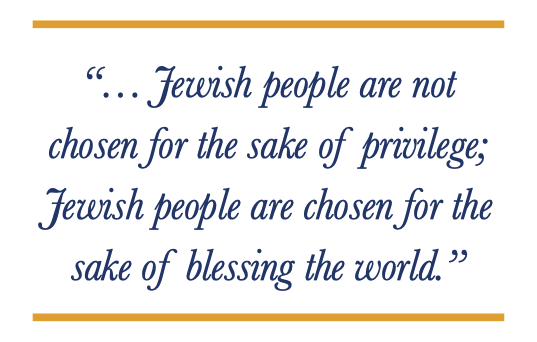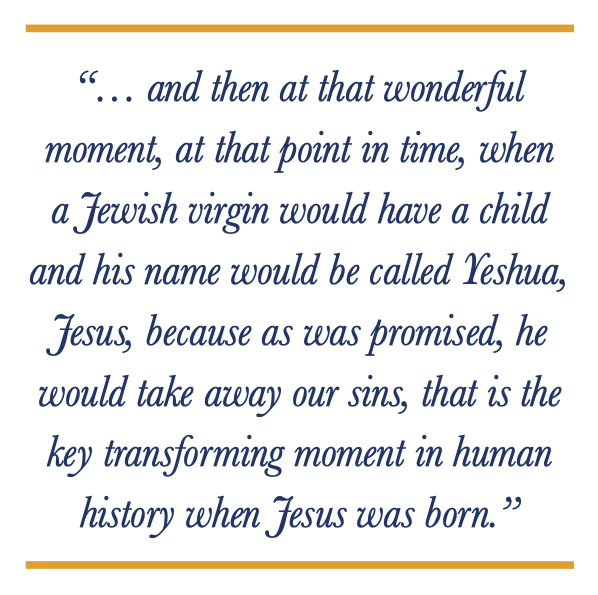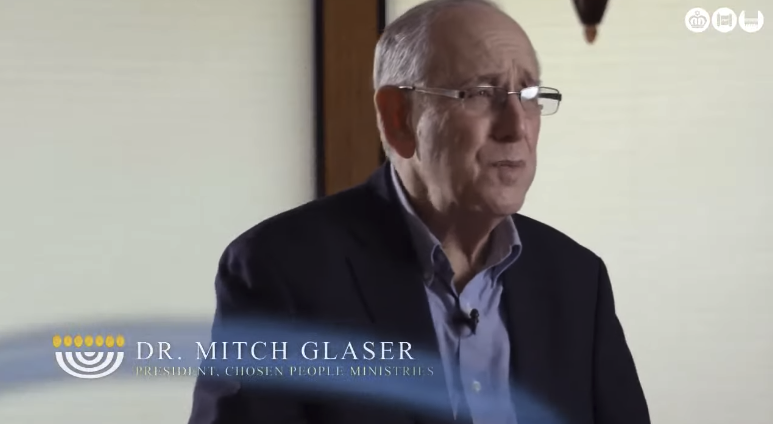Shalom dear friends,
I’m communicating to you from the true holy land, Brooklyn, from the Charles Feinberg Center in the heart of Orthodox Jewish Brooklyn, much like your beautiful new centre in Caulfield. I wish I could be there with you to celebrate this new facility and to just say ‘Hi’ and hug everybody.
At least I can get to you a little bit this way through this newsletter and by video*. I hope that you’ll receive this message in a way that will be helpful and inspirational to you, particularly as we begin this new year, 2022, hoping for better things.
 The basis for the priority of Jewish evangelism as we see it and as traditionally Chosen People Ministries has seen it – now we’re in our 127th year; we were founded in 1894 – is found in this passage of scripture that has been foundational for all that we do, and I hope that you’ll better understand that as I go along. In Romans 1:16, the apostle Paul, himself of course a messianic Jew, a Jewish believer in Jesus, says, “For I am not ashamed of the gospel for it is the power of God for salvation to everyone who believes, to the Jew first and also to the Greek.”
The basis for the priority of Jewish evangelism as we see it and as traditionally Chosen People Ministries has seen it – now we’re in our 127th year; we were founded in 1894 – is found in this passage of scripture that has been foundational for all that we do, and I hope that you’ll better understand that as I go along. In Romans 1:16, the apostle Paul, himself of course a messianic Jew, a Jewish believer in Jesus, says, “For I am not ashamed of the gospel for it is the power of God for salvation to everyone who believes, to the Jew first and also to the Greek.”
Franz Delitzsch, a great Old Testament scholar, said that when the church tries to evangelise the world without evangelising the Jew first, it’s like a bird trying to fly with one wing. Pretty poetic. As a leader of a traditional Jewish mission, I absolutely believe that the Jewish people need to believe in Jesus the Messiah: in Yeshua, his Hebrew name. There are so many passages of scripture that tell us that there’s simply no other way to have a personal relationship with God other than through Yeshua, the Messiah. He is the promised Messiah, the promised mediator. He is both sacrifice and priest, and it’s through him that we’re able to approach our heavenly Father.
And you know the verses. John 14:6, “I am the way, the truth, and the life. No one comes to the Father but through me.” John 4:12, “No other name under heaven whereby men must be saved.” And of course, John 3:16, “For God so loved the world that he gave his only,” [only, unique] “only begotten son, that whosoever,” [it’s for everybody] “believes in him will not perish, but have everlasting life.”
It’s that gift of everlasting life that comes through the forgiveness of sin by our accepting Yeshua as our Messiah. The gospel is not a new philosophy. It’s not a new religion. It’s a relationship with the God of Abraham, Isaac, and Jacob through his son, Yeshua. That’s our message. Everything we do is all about him, isn’t it? We preach Yeshua through whom we receive the gift of everlasting life. Now, maybe for some of you, this sounds a little simplistic, I hope not, but it’s my clear understanding of what the text reads in the New Testament. Exclusivity, as a way to God, was not invented by Yeshua. If you read through the Old Testament carefully, you’ll notice that the temple was established, the sacrifices were established. There was no other place to make a sacrifice. Just ask Saul; he made a big mistake in sacrificing in the wrong spot. So, we understand all the way through the Old Testament, the Hebrew Scriptures, that there is an exclusivity to the path to God. And it’s not just any God. It’s the God of Abraham, Isaac, and Jacob. There are a lot of gods in this world. There are a lot of major religions in this world. What the New Testament is saying, and what the Hebrew Scriptures are saying – the Old Testament – is that there is only one way to the one true God. Romans 1:16 makes no sense unless you have these fundamentals understood. “For I am not ashamed of the gospel, for it is the power of God unto salvation to everyone that believeth, to the Jew first and also to the Greek.” KJV.
 What we learn in this passage fundamentally, maybe even first of all, is that it’s impossible for any human being through their own effort to satisfy God’s demands for righteousness. So, we need something outside of who we are. Paul actually confirms that in verse 17, “For in it,” [the gospel], “the righteousness of God is revealed from faith to faith, as it is written, but the righteous man shall live by his faith.” And so, the only way to grab hold of this salvation through Yeshua, the Messiah, is through faith, not through works. We can never achieve the standards. All we could do is fail. In fact, by trying to keep the Torah, the law – as beautiful as it is, and in Romans 7 Paul says it’s good – but we fail when we try to keep the law not because the law is deficient, but because we are deficient. We are born in sin, as the Bible teaches, and the law teaches us that we need a saviour.
What we learn in this passage fundamentally, maybe even first of all, is that it’s impossible for any human being through their own effort to satisfy God’s demands for righteousness. So, we need something outside of who we are. Paul actually confirms that in verse 17, “For in it,” [the gospel], “the righteousness of God is revealed from faith to faith, as it is written, but the righteous man shall live by his faith.” And so, the only way to grab hold of this salvation through Yeshua, the Messiah, is through faith, not through works. We can never achieve the standards. All we could do is fail. In fact, by trying to keep the Torah, the law – as beautiful as it is, and in Romans 7 Paul says it’s good – but we fail when we try to keep the law not because the law is deficient, but because we are deficient. We are born in sin, as the Bible teaches, and the law teaches us that we need a saviour.
Now, everything in Romans 1:16 is written in the present tense. “For I am not ashamed of the gospel.” Paul was saying this currently, in present tense, “I am not ashamed.” Whether he was brought before the Romans or put in a Roman jail and witnessing, no matter what it was, Paul was never ashamed. So Paul is not ashamed, present tense.
Then we read, “For it is the power of God unto salvation.” So, was the gospel the power of God or is the gospel the power of God? The distinction is so important. He’s not ashamed, present tense. The gospel is the power of God. It’s dunamis, dynamite; it’s explosive, it’s life-changing, life-transforming. So, it’s in the present tense. For salvation, we know what it’s for, to get us saved, to everyone who believes. It’s for salvation now to everyone who believes now. It’s all in the present tense.
Then Paul continues, “To the Jew first and also to the Greek.” Now, unfortunately, some people all-of-a-sudden make a sharp turn when it comes to these last few words of the text, and almost insert the idea that the gospel was to the Jew first, not is to the Jew first. If everything else is in the present tense, brothers and sisters, then how could we possibly say that these few words revert to the past tense? Remember, he was writing a couple of decades after Yeshua died and rose and ascended, so he’s not really describing what happened when Yeshua came, he’s describing the way he sees the situation right then and there, as he is trying to fulfill the ministry that God gave him to be an apostle to the Gentiles, a Jewish apostle to the Gentiles, and a well-educated Jewish apostle to the Gentiles. Maybe God could have chosen someone else, but he didn’t; he chose Paul. So, there is a priority to Jewish evangelism, but we need to understand how this works. There are a lot of common understandings of Romans 1:16 that I don’t think really answer the questions the text brings out.
There’s a historic application: the gospel was to the Jew first and now it’s to the Gentiles. In other words, the gospel came to the Jewish people, Jesus came to the Jewish people, and the Jewish people, although I would believe it was a particular group of leaders, rejected Him. Therefore, Yeshua then went to the Gentiles. The gospel that Paul received to communicate to the world was a gospel that was rejected by the Jewish people. Therefore, it was now intended for the Gentiles. Do I believe that that is true? No actually, I don’t. Not at all.
Secondly, some people think it’s a missiological bridge; it’s a redemptive parallelism in some ways. In other words, if the gospel was to the Jew first, it was because the Jews would understand it better. There was no theological reason, there was nothing about the plan of God. It’s just that Jewish people at least were supposed to know the Hebrew Scriptures, went to synagogue, heard the reading of the scriptures, and therefore would better understand who the Messiah was because the Messiah was a concept that comes from the Hebrew Scriptures; certainly doesn’t come from Roman or Greek mystery religions. So, when Paul went from place to place and started in the synagogue, some people will say he was just a smart missionary, he was just a smart witness for Yeshua, and there’s no significance to what he did. It was just a better way, particularly to reach the proselytes in the synagogue, and then the proselytes in the synagogue would go home and reach their not-converted-to-Jewish friends, neighbours, and family. Do I think that that’s true? Well, it sounds like a good strategy, but I don’t think that’s why the verse is there.
Paul is not suggesting, also, and I think this is very important, that we withhold the gospel from the Gentiles until we reach the Jewish people first. I think that is really a very poor interpretation, and that extreme causes Christians throughout the ages to run to other kinds of interpretations, which are not very helpful. So, do I think that we need to reach all the Jewish people in Brooklyn, for example, where we have almost a million Jewish people, and probably 30% of them are ultra Orthodox? Or the 75,000 Jewish people in the Caulfield area? That is, before we start reaching all the Gentiles? Well, we’d be here until Yeshua returns trying to reach the Jewish people. That interpretation is impractical, and it’s not in any way what the text implies. So, we’re not dealing with extremes; we have to really understand what the Apostle Paul is saying. Maybe one of the best ways is to see what the apostle did.
So what did Paul do? Well, when he went out on his missionary journeys, he started in the synagogue, not simply because it was a bridge to redemption, or that he was able to make these redemptive analogies, it actually was because the Jewish people were to be first, in the hearing of the gospel. So, even though he was the apostle to the Gentiles, he continually went to the Jewish people first. You can see that in Acts 13:13-52, Acts 14:1-5, Acts 18:7-11, and Acts 19:8-10. To quote one illustration:
In Iconium, they entered the synagogue of the Jews together and spoke in such a manner that a large number of people believed, both of Jews and of Greeks.” [Probably proselytes]. “But the Jews who disbelieved stirred up the minds of the Gentiles, and embittered them against the brethren. Therefore, they spent a long time there speaking boldly with reliance upon the Lord, who was testifying to the word of His grace, granting that signs and wonders be done by their hands. But the people of the city were divided. And some sided with the Jewish people and some were the apostles. And when an attempt was made by both the Gentiles and the Jews by their rulers to stone them, they became aware of it and fled to the cities of Lycaonia, Lystra, Derby, and the surrounding area.”
Did the apostles give up on the Jewish people just because there was a bit of a negative response? Well, if I would have done that, I would’ve left Jewish ministry for all time, because most Jewish people are not for Yeshua. In this day and age, there’s only a remnant according to God’s gracious choice, Paul said that in Romans 11:5. Please don’t buy into the myth that Romans 1:16 says that we have to reach all the Jewish people before we reach the Gentiles. We need to prioritise Jewish evangelism in some way in order to fulfill this mandate.
Number one, it is a priority based upon God’s promise from Genesis chapter 12 verse three, when He said to Abraham, “Through you, all the of families of the Earth will be blessed. I’ll bless those who bless you and I’ll curse those who curse you, and through you, all the families of the Earth shall be blessed.” God tells the Gentiles, the non-Jews, to bless the Jewish people because the Jewish people are going to do something incredibly important that’s ultimately going to be a benefit to the entire world. In other words, the Jewish people were not chosen for our own sake. We were chosen to be a bridge of redemption to bring people to the Father. And the way we have done that is through God writing the Bible through the Jewish people, for helping the Jewish people to preserve the scriptures throughout the ages, and then at that wonderful moment, at that point in time, when a Jewish virgin would have a child and his name would be called Yeshua, Jesus, because as was promised, he would take away our sins, that is the key transforming moment in human history when Yeshua was born.
It is also a priority based upon God’s future plan. Romans chapter 11, beginning at verse 12: “Now, if their transgressions is riches for the world and their failure riches for the Gentiles, how much more will the fulfillment be? For if their rejection is the reconciliation of the world, what will their acceptance be, but life from the dead?”
 In other words, there’s a day coming when the Jewish people will turn to Yeshua, and Yeshua will return and all those wonderful promises from the Hebrew Scriptures of the removal of a curse, as Paul reaffirms in Romans eight, all of these wonderful promises of the presence of the Lord, the fulfillment of the Davidic covenant, of Yeshua sitting on his throne, of the knowledge of the Lord filling the Earth as the waters fill the sea, all of this is going to take place ultimately when God’s chosen people turn to the Messiah and the Messiah returns.
In other words, there’s a day coming when the Jewish people will turn to Yeshua, and Yeshua will return and all those wonderful promises from the Hebrew Scriptures of the removal of a curse, as Paul reaffirms in Romans eight, all of these wonderful promises of the presence of the Lord, the fulfillment of the Davidic covenant, of Yeshua sitting on his throne, of the knowledge of the Lord filling the Earth as the waters fill the sea, all of this is going to take place ultimately when God’s chosen people turn to the Messiah and the Messiah returns.
Now, look at Romans chapter 11 verse 25 and following. “For I don’t want you to be uninformed of this mystery so that you be wise in your own estimation, that a partial hardening… “ [This happened to Israel. It’s only partial because I’m a believer and other Jewish people are believers. So, it’s only a partial hardening.] “…until the fullness of the Gentiles come in.”
I want to remind you, Gentile evangelism is on the clock. It is urgent because the times of the Gentiles, as we read in Luke 21, will be fulfilled. In other words, the day will come when we can no longer work because night will have come. And Yeshua constantly spoke about the urgency. Paul constantly spoke about the urgency. I think the urgency is very much related to Gentile evangelism. We need to reach the Gentiles before the opportunity is done, because it’s linked to the salvation of Jewish people.
But don’t forget the Gentiles, because the Gentiles are an urgent matter right now. This is a partnership between all of us. No matter who you are, whether you’re part of a local church or part of a messianic congregation, part of a Jewish mission organisation like Chosen People Ministries or Celebrate Messiah, God has called us to walk arm in arm to proclaim the gospel, not to the Jewish people alone, not to the Gentiles alone, but to both Jews and Gentiles, but to keep Jewish evangelism as a priority of heart. Jewish people are not chosen for the sake of privilege; Jewish people are chosen for the sake of blessing the world. And so the greatest act of kindness and blessing we can bring to the Jewish people, God’s chosen people, is to tell them about Yeshua so that Jewish people can now take this all the way to the end of the line. When you can’t talk to a Jewish person about Yeshua because you may not know a Jewish person, or you’re not finding any Jewish people that are open, you can always talk to Yeshua about that Jewish person. Prayer is an essential in the great commission and in bringing the gospel to the Jew first and also to the Gentile.
I’ll be praying for you, my dear friends, all who are part of the Celebrate Messiah family. I thank you, Lawrence and Louise, for your faithfulness and for the great work that you’re doing. Can’t wait for the day when I can visit Australia again and see the beautiful Caulfield Messianic Centre. What a joy it is to partner with you. I bring you greetings from all our Chosen People congregations and the Chosen People staff.
Until we can be together face to face, let’s ask God to help us because reaching Jewish people with the gospel is so important to us. Let’s ask the Lord to give us ways and means of sharing the gospel, whether it be online or where possible in person, knowing that that’s going to get better as time goes on. Let’s pray for one another and be mutually assured that the best days for the gospel are yet ahead.
Mitch Glaser
President, Chosen People Ministries
*This letter has been adapted from a message that Dr Glaser presented to Beit HaMashiach Messianic Congregation on 8 January 2022. You can view this at beithamashiach.com/sermons.
Download Newsletter
Would you like the full newsletter? Click on the Download button for the full PDF version.
Join our mailing list today!
*The newsletters are in PDF Format.
Give Today!
Join our mailing list today and stay up to date with all the latest news!
Sign Up for Our Email Newsletter
Sign up for Celebrate Messiah email newsletters to receive more information on our ministries, events, and outreach to the Jewish people around the world:






